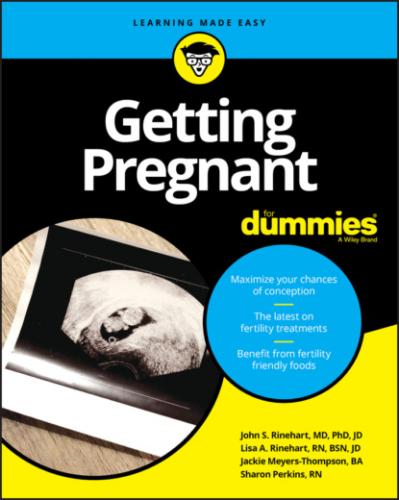Balancing the yin and yang of exercise
So your partner decided to work out stress by bicycling or playing rugby. This exercise should be a good thing, right? Wrong! Prolonged cycling can cause damage to the groin from constant pressure of the bike seat, and contact sports can lead to injury to the testicles and can damage sperm production. The emphasis here is on prolonged cycling, not recreational cycling. However, most studies evaluated the effect of cycling on semen parameters and not on reducing the fertility rate. For males with a normal semen analysis, exercise (especially recreational exercise) does not seem to alter the man’s fertility potential. For males with mildly abnormal semen parameters, reducing exercising levels, especially cycling, may have a beneficial effect.
Women who exercise heavily may find that their periods have stopped. This condition is called amenorrhea (we get into this in Chapter 11) and is common among women who are very thin and exercise daily. Obviously, you can’t get pregnant if you’re not having periods; you’re not developing eggs. Particularly concerning is the triad of no periods, heavy exercise, and bulimia. This triad requires treatment by a physician. So what can you both do to reduce stress that won’t cause fertility problems? Exercise in moderation is fine — for both of you!
Dumping the douche
Avoiding toxins at home and away
Think about substances that you’re exposed to at work. For instance, if you’re a home remodeler, bridge painter, welder, or solderer, you may be exposed to large amounts of lead. You run the same risk if you’re remodeling an old house and scraping old paint off the walls. Lead exposure in men has been linked to low sperm count and decreased motility of sperm. In women, lead exposure may cause low birth weight in babies, high blood pressure during pregnancy, damage to the baby’s nervous system, and developmental delays.
Heavy, exertional work can lead to reduced sperm counts, but there is little evidence about the effect of this on actual fertility rates.
The advent of OSHA (the federal Occupational Health and Safety Agency) has provided safe work environments for almost all occupations. Since this is true, it is hard to imagine that there are strong negative influences on fertility rates based upon occupations. In fact, even though OSHA lists a few known toxins that could affect fertility (nitrous oxide, lead, jet fuel, and a variety of pesticides), it clearly states that these substances may not affect all workers, or all workers in the same way.
There are a few studies that identify some environmental toxins that may (emphasis on the possibility, not the probability) impact a person’s infertility. These include hexachlorocyclohexane, polychlorinated biphenyls (PCBs), dichlorodiphenyltrichloroethane (DDT), some pesticides, and ingested heavy metals (mercury and lead).
Making the connection between stress and fertility
Can stress keep you from getting pregnant? First of all, what is stress? One Google definition is “a state of mental or emotional strain or tension resulting from adverse or very demanding circumstances.” However, a key factor resulting in elevated stress is the person’s reaction to a situation. Some circumstances create more stress for some people than for other people.
Dr. R: I remember one patient who had a very achievement-oriented, high-powered North Shore Chicago–type job. She found not being able to conceive at her command almost intolerable since for most everything else she had tried she was successful. Somehow, she was convinced by well-meaning friends and family that if she would only relax, she would become pregnant. So, she quit her job and stayed at home eating well and exercising. Since she was not working, she could devote every waking moment to her quest. After about two weeks of “rest” she was climbing the walls with boredom and her stress level was truly off the charts. She went back to work, adjusted her schedule to allow her to pursue treatment protocols, and fortunately, after considerable work and persistence, she had her first child. Child number two came as a complete surprise since not everything was perfect yet for that second child. The point: Many active people need to maintain a certain level of activity to control their stress. Don’t confuse activity with stress.
Full disclosure: Dr. R is not a firm believer that stress is a significant cause of infertility. He is a strong believer that infertility causes stress. To that end, anything that will reduce your stress and allow you to pursue treatment is desirable.
What can you do to reduce stress? We talk more about stress-reducing techniques in Chapter 9, but in general:
Talk it out. Stress increases when you hold everything in.
Try to focus on the “big picture.” When you’re trying to get pregnant, every failed month seems like a year — or the end of the world. When you finally do get pregnant, it won’t matter whether you got pregnant in November or January. Remember that the odds are on your side, in most cases, and that you will get pregnant.
Don’t lose sight
